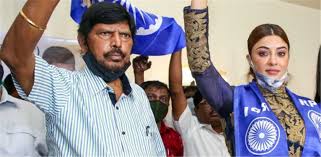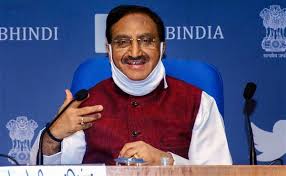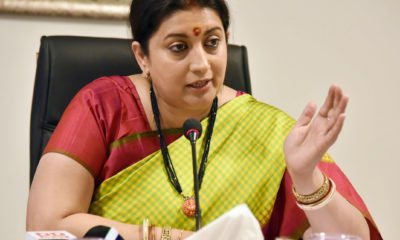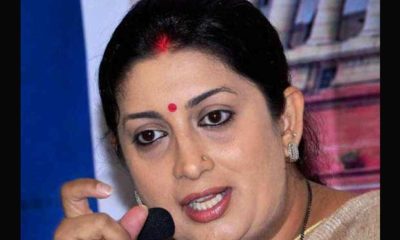Feature
Dalit suicide: Protests continue at Hyderabad University

 Hyderabad: As after the suspension of four Dalits has been cancelled by the executive council of the Hyderabad Varsity, the students protest has not received any stillness process and demanding the removal of Vice Chancellor P. Appa Rao over the suicide of a Dalit research scholar Rohith Vemula.
Hyderabad: As after the suspension of four Dalits has been cancelled by the executive council of the Hyderabad Varsity, the students protest has not received any stillness process and demanding the removal of Vice Chancellor P. Appa Rao over the suicide of a Dalit research scholar Rohith Vemula.
The revocation of suspension of four Dalit students by the executive council of the central university failed to pacify the students, who say that their prime demand is the resignation of the vice chancellor and action against him, two central ministers and others responsible for the suicide of Rohith Vemula.
The Joint Action Committee (JAC) for social justice, an umbrella organisation of 14 student groups, continued the protest for the fifth consecutive day, ignoring the appeal by the vice chancellor to return to classes and help resume normalcy on the campus.
The indefinite strike by seven JAC members entered the third day. The four suspended students also continued their sit-in at ‘veligonda’ (Dalit ghetto), a small makeshift tent, where they had been protesting since early this month to protest their suspension by the university authorities over an alleged clash with a leader of Akhil Bharatiya Vidyarthi Parishad (ABVP).
Rohith, a PhD student, committed suicide by hanging himself in his friend’s hostel room on January 17, triggering protests on the campus and also in other universities in different parts of the country to demand action against those involved in suspension of the students and subjecting them to social boycott.
As many as 13 faculty members belonging to scheduled castes and scheduled tribes have also resigned from their administrative roles to protest Union Human Resource Development Minister Smriti Irani’s statement that a Dalit professor headed the sub-committee of executive council which suspended the five students.
The SC/ST Teachers and Officers’ Forum said the central minister uttered lies and made a misleading statement.
Meanwhile, a meeting of University of Hyderabad Teachers’ Association is scheduled later Friday to chalk it future course of action in view of the suggestion by a section of teachers that classes should resume.
Leaders of various political parties continue to visit the campus to express solidarity with the students and demand action against central ministers Bandaru Dattatreya and Smriti Irani for their interference in an incident in the campus, which resulted in suspension of Dalit students.
Entertainment
Meghalaya Reserves Legalized Gambling and Sports Betting for Tourists

The State Scores Extra High on Gaming-Friendly Industry Index
Meghalaya scored 92.85 out of 100 possible points in a Gaming Industry Index and proved to be India’s most gaming-friendly state following its recent profound legislation changes over the field allowing land-based and online gaming, including games of chance, under a licensing regime.
The index by the UK India Business Council (UKIBC) uses a scale of 0 to 100 to measure the level of legalisation on gambling and betting achieved by a state based on the scores over a set of seven different games – lottery, horse racing, betting on sports, poker, rummy, casino and fantasy sports
Starting from February last year, Meghalaya became the third state in India’s northeast to legalise gambling and betting after Sikkim and Nagaland. After consultations with the UKIBC, the state proceeded with the adoption of the Meghalaya Regulation of Gaming Act, 2021 and the nullification of the Meghalaya Prevention of Gambling Act, 1970. Subsequently in December, the Meghalaya Regulation of Gaming Rules, 2021 were notified and came into force.
All for the Tourists
The move to legalise and license various forms of offline and online betting and gambling in Meghalaya is aimed at boosting tourism and creating jobs, and altogether raising taxation revenues for the northeastern state. At the same time, the opportunities to bet and gamble legally will be reserved only for tourists and visitors.
“We came out with a Gaming Act and subsequently framed the Regulation of Gaming Rules, 2021. The government will accordingly issue licenses to operate games of skill and chance, both online and offline,” said James P. K. Sangma, Meghalaya State Law and Taxation Minister speaking in the capital city of Shillong. “But the legalized gambling and gaming will only be for tourists and not residents of Meghalaya,” he continued.
To be allowed to play, tourists and people visiting the state for work or business purposes will have to prove their non-resident status by presenting appropriate documents, in a process similar to a bank KYC (Know Your Customer) procedure.
Meghalaya Reaches Out to a Vast Market
With 140 millions of people in India estimated to bet regularly on sports, and a total of 370 million desi bettors around prominent sporting events, as per data from one of the latest reports by Esse N Videri, Meghalaya is set to reach out and take a piece of a vast market.
Estimates on the financial value of India’s sports betting market, combined across all types of offline channels and online sports and cricket predictions and betting platforms, speak about amounts between $130 and $150 billion (roughly between ₹9.7 and ₹11.5 lakh crore).
Andhra Pradesh, Telangana and Delhi are shown to deliver the highest number of bettors and Meghalaya can count on substantial tourists flow from their betting circles. The sports betting communities of Karnataka, Maharashtra, Uttar Pradesh and Haryana are also not to be underestimated.
Among the sports, cricket is most popular, registering 68 percent of the total bet count analyzed by Esse N Videri. Football takes second position with 11 percent of the bets, followed by betting on FIFA at 7 percent and on eCricket at 5 percent. The last position in the Top 5 of popular sports for betting in India is taken by tennis with 3 percent of the bet count.
Local Citizens will Still have Their Teer Betting
Meghalaya residents will still be permitted to participate in teer betting over arrow-shooting results. Teer is a traditional method of gambling, somewhat similar to a lottery draw, and held under the rules of the Meghalaya Regulation of the Game of Arrow Shooting and the Sale of Teer Tickets Act, 2018.
Teer includes bettors wagering on the number of arrows that reach the target which is placed about 50 meters away from a team of 20 archers positioned in a semicircle.
The archers shoot volleys of arrows at the target for ten minutes, and players place their bets choosing a number between 0 and 99 trying to guess the last two digits of the number of arrows that successfully pierce the target.
If, for example, the number of hits is 256, anyone who has bet on 56 wins an amount eight times bigger than their wager.























